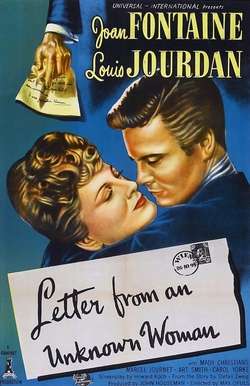Letter From an Unknown Woman

"By the time you read this I may be dead."
Based on the 1922 novella of the same name, Letter from an Unknown Woman is a 1948 film directed by Max Ophuls.
Pianist Stefan Brand comes home one night a few hours from a duel in which he has no interest in participating. Before he prepares to leave the city, he receives a letter that begins with the above quote.
Max Ophuls had 18 European films to his credit when he fled Europe in 1941 for Hollywood, where he initially freelanced as a writer and director, and later helmed Letter From an Unknown Woman. The bittersweet costume drama set in 1900 Vienna is an intimate portrait of a woman (Joan Fontaine) and her consuming adoration for a charming, womanizing concert pianist (Louis Jourdan). Told primarily in flashback, the film's fluid long takes, elaborate camera movement, opulent detail, and visual repetition are some of Ophuls' stylistic trademarks. Deemed "too European" and "schmaltzy," the picture was a box-office failure in the United States, but gained popularity through television in the ‘50s.
(Description copied from "Brief Descriptions and Expanded Essays of National Film Registry Titles", which the Library of Congress has placed into the public domain.)
- Anguished Declaration of Love: Lisa's letter to Stefan.
- The Casanova: Stefan thinks it's Looking for Love In All the Wrong Places.
- Downer Ending
- Framing Device: Lisa's letter.
- The Gay Nineties
- Love Martyr: Lisa.
- Source Music: Stefan plays Il Sospiro by Franz Liszt, which follows throughout the film.
- Star-Crossed Lovers: Stefan and Lisa.
- Tall, Dark and Handsome: Stefan.
"If only you could have shared those moments, if only you could have recognized what was always yours, could have found what was never lost. If only..."